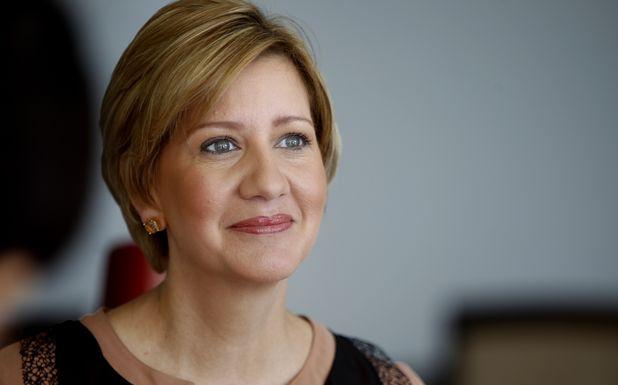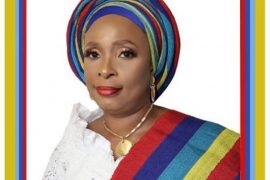The Republic of Panama has been all too fortunate to have a uniquely built knack for humanitarian serve. Though with a journalistic background, she has found the perfect mid-point to marry the tenets of her profession with her duties as the first lady of the Republic of Panama by employing unique principles.
In an exclusive interview with the Amazons Watch Magazine’s editorial team, H.E. Lorena Castillo De Varela, the First Lady of the Republic of Panama shares some of the principles she has used in achieving outstanding success in most of her projects. Excerpt:
Before your emergence as First Lady of the Republic of Panama in 2014, it is fascinating that you invariably demonstrated a strong commitment on matters of humanitarian and social support, in the exercise of your profession as a journalist. Kindly tell us about yourself and what awakened your interest in humanitarianism.
Panama has experienced great development and economic growth, but this has not always been so. The country has actually reached the neediest. As a journalist I had a lot of access and contact with people throughout the country, having the opportunity to learn about the problems and needs of the population. This captivated me with my roots and the people and I thought of why in the capital there were services and infrastructures, which were not available in the interior of the country.
Being a journalist and news anchor gave me some extra strength through the fourth power – journalism. Being able to transform lives and use the fourth power in favour of the people. Far beyond the personal ego and fame. It was not about me, but that they were putting me in that place – as I still am today – to serve other people, to serve as a conduit to solve the problems and needs that the population had and that many times the governments did not know about.
That’s what also captivates me as the first lady because I was not interested in politics, but the possibility to transform lives, to help so many people and to be that voice of those who are not heard, is what makes us put life, heart, and soul every day to what we do.
In 2002, you won the National Journalism Award given by the Forum of Journalists, with the report of Disabled Children in Cuba. In 2007. You were the presenter of “Roofs of Hope”, a television program through which decent homes were built for Panamanians without homes. A lot of our readers, particularly women in this line of the profession across developing nations, will be interested in knowing how you were able to help families and changed their quality of life, using the media as a tool. Your Excellency, please tell us how you were able to achieve this feat.
Never in my dreams did I think I was going to win the National Journalism Prize, much less from the National Forum of Journalism. Through that report, I wanted to convey the essence of Cuba. I walked the streets of Cuba, I met spectacular people, who despite their difficulties were so grateful, so happy and good. They welcomed us with great affection and always received us with a big smile. They were always cheerful and I said that I had to transmit that to Panama. I met the school solidarity with Panama and I see how they treat and educate children with disabilities and I made several journalistic deliveries where it reflected the tenacity, happiness, and desire to live from these kids.
On the basis that journalism is the fourth power, you have to know how to use it for the good of humanity. I have always focused my work on presenting the truth, the reality of the facts, without any manipulation whatsoever. It is always important to present the truth of what is happening, its reality, and its history.
The importance of the media and journalists is to present the truth with love, and show that we are beings- multipliers of love.
Over the last 3 years serving as the First Lady of Panama, you have become known, the world over, for your humanitarian efforts and support for projects aimed at alleviating the myriads of challenges in your country and region. In 2015, in recognition of your commitment to reducing the HIV epidemic in the country and in the region, you were named Special Ambassador for UNAIDS to combat AIDS in Latin America. You also received the title of Honorary President of the Panamanian Red Cross and presides the National Council for Comprehensive Care for Early Childhood and the National Commission for the Prevention and Control of Human Immunodeficiency Virus (CONAVIH). Please tell us the scope of your involvement in these humanitarian causes as well as other programmes you have initiated and support to benefit the most vulnerable sectors of the population.
As UNAIDS Special Ambassador for Latin America, I have led globally the zero-discrimination movement that aims to create a climate of respect, solidarity, and inclusiveness, so that all people can live without fear of being attacked, criminalized or stigmatized. I have encouraged individuals, communities and local, national and regional leaders to defend and support zero discrimination throughout Latin America and have also advocated in different high-level spaces for more funding from the HIV response.
I have also advocated that the barriers that prevent people affected by HIV/AIDS from accessing quality health services are eliminated because they are advancing on gender equality and women’s empowerment to reduce the new cases of AIDS.
In addition, from my office, at a national level in Panama, we promote workshops for the prevention of bullying in schools. These workshops foster students, teachers, and parents the importance of encouraging environments of healthy and peaceful school coexistence that contribute to preventing situations of bullying in schools. These workshops are preventive because the purpose is to encourage the establishment of an environment where the family, the pupil and the teachers are involved so that they can act in situations of conflict that are presented in classrooms.
In my role as Honorary President of the Red Cross, I have urged all organized groups and communities to work together to minimize vulnerability in our communities and to promote the creation of the Joint Task Force, which is composed of diverse entities with the purpose of ensuring the safety of people and provide prompt and timely humanitarian assistance when required.
While as President of the National Council for Comprehensive Early Childhood Care (CONAIPI) in conjunction with institutions and civil society organizations, we support and boost the implementation of the public policy of comprehensive attention to the first Childhood whose goal is for all children under the age of five to have access to early stimulation, education, comprehensive health and nutrition. This initiative reaffirms the commitment of the Government of Panama to prioritize comprehensive care for early childhood as a State policy.
As president of the National Commission for the Prevention and Control of Human Immunodeficiency Virus (CONAVIH), we are promoting the gratuitousness of the HIV rapid test. Panama is a pioneer in establishing the free diagnosis of HIV, syphilis and its treatment with the highest risk of HIV infection and adolescents in all state health facilities. This was established in Executive Decree no. 214 of May 17, 2016. It is also indispensable that all public and private sector health personnel are called for to promote the test for the early diagnosis of HIV and syphilis in order to achieve a decrease in the number of people with diagnosed infection and the transmission mother to child. This is added to the establishment since 2015 of the free HIV test for pregnant women. A coverage of 90% was achieved, lowering the prevalence of the mother-to-child transmission of HIV to 3.7%.
In June 2016, representatives of 45 institutions signed the “Act of the commitment of the governmental institutions in the prevention of HIV and Zero discrimination”, through which the Regents of the entities undertake to develop activities related to the promotion of STI/HIV and Zero Discrimination, in addition, to actively participate in programs, projects, and actions that develop as an inter-agency network.
The CONAVIH is an instance composed by entities, private companies, and civil society organizations, promoting actions to prevent the advancement of the disease, including purchasing processes that guarantee the supply of medicines to treat people with HIV.
The fight against HIV/AIDS is one area of your passion; In Panama, 14, 568 cases were reported in 2015, of which 9, 611 have died and 13, 847 people are living with this disease. What are some of your efforts and successes as well as that of your country in reversing this worrisome trend?
As part of efforts to eliminate the HIV/AIDS epidemic, the Government of the Republic of Panama led by my husband, President Juan Carlos Varela, has launched a number of initiatives to ensure attention and zero discrimination towards People living with HIV and the population in general.
In this sense, more than $38 million has been invested in care, monitoring and treatment programs targeted at people living with HIV. Through the single-price system, the country has 95% guaranteed the supply of antiretroviral drugs for people with HIV.
In addition, 16 antiretroviral clinics have been installed nationwide for free care of people living with HIV. In these clinics the patients are evaluated free of charge by an interdisciplinary team composed of nurses, laboratory, psychologists, social workers and specialist, who are in charge of making the prognostic tests every 3 or 4 months, to detect the number of viruses that travel through the bloodstream and how the immune system assimilates treatment. Antiretroviral treatment is delivered completely free of charge.
Also, 6 friendly clinics have been installed aimed at providing counselling and prevention to at-risk groups. Part of the orientation is carried out the free tests of HIV/AIDS and if a new patient is detected, it is referred to an antiretroviral clinic where the treatment will be provided.
To strengthen the attention and empathy to the people who attend these facilities, the human resource of medical centres are trained on how to approach and provide attention according to the specific needs of these groups. We work in evening hours outside the traditional hours of care to facilitate access to users who on a daily basis, would not access these centres for fear of discrimination and services are provided free of charge.
Panama launched for the third consecutive year, the nationwide “Life-Saving TEST” campaign, which seeks to improve HIV testing coverage and take steps to achieve the first 90 of accelerated action.
Stigma, discrimination, and violence are barriers to the fight against HIV/AIDs. In Panama, findings reveal that 9% of people living with HIV have been denied health services because of their HIV status, and 27% of people living with HIV did not receive counselling when they were tested for HIV. Recently, on the occasion of the 40th UNAIDS Programme Coordination Board, you delivered a passionate speech saying it is the right of everybody to have access to essential health and education services without fear of being harassed, mistreated or rejected; as without an end to discrimination, there would be no end to the AIDS epidemic. Kindly tell us about your commitment and the success rate of your zero discrimination agenda in Panama.
Discrimination is a reality and it is shameful that in 2017 when we have all the tools to end the AIDS epidemic, we still have to fight against prejudice, exclusion and criminalization, not only in households but in the streets, hospitals, police stations and courts. For this reason, from different forums at the level of Panama and internationally I have insisted that discrimination is a serious violation of human rights, is illegal, immoral, offensive and inhumane and that it is the responsibility of all to respect, defend and promote the fundamental rights for achieving sustainable development.
Work tirelessly, with the mission of breaking the silence, to reach every corner of Panama, Latin America, and the world, with a message of inclusion, solidarity, peace, and respect, through the movement Zero Discrimination.
Always insist that nobody is better than anyone, we all have the same rights. I do not have to like you, you do not have to be my friend, you do not have to agree with what I think or how I choose to live my life, but you have to respect me.
In the case of Panama, through CONAVIH we have been able to give voice to key groups and as I mentioned earlier, friendly clinics and antiretroviral clinics have been established to provide the population affected by HIV/AIDS and groups at risk attention and guidance they require. In addition, a training process was established for physicians and technical personnel to strengthen care for people living with HIV at the first level of health care.
Love on Wheels is also one of your complimentary initiatives in the fight against HIV/AIDS. Can you tell us about this initiative, what inspired it and what are some of the successes that have been recorded so far?
This is an initiative that has been implemented since the year 2006. Through the mobile “Love on Wheels” clinic, various medical services are offered such as mammography tests, electrocardiograms, general medicine. Knowing the needs of the population living in areas of difficult access and in the indigenous regions, a few months since my arrival at the office of the First Lady of Panama we set ourselves as a goal to extend the coverage and medical services offered to the population. This led us to coordinate with the Ministry of Health the free application of rapid HIV/AIDS testing.
This initiative has allowed us to extend this service, to orient the general population on this disease, to capture and to offer to the affected timely and quality attention. From October 2014 to 18 August 2017, 7000 rapid HIV testing has been done.
You are the Honorary President of the Panamanian Red Cross. And In 2016, you expressed an interest in establishing a Red Cross Humanitarian logistics hub in Panama to boost the support that the Red Cross provides at an international scale. What is the status of this initiative?
The Regional Logistics Centre for Humanitarian Assistance (CLRAH) known as the humanitarian Hub and in its second phase of construction will put the logistics platform of Panama at the service of the region for timely delivery of aid in the event of natural disasters and Disasters.
This second phase comprises the civil works of buildings that will house three important humanitarian assistance actors: the United Nations humanitarian Response Deposit (UNHRD), operated by the World Food Programme (WFP); the Federation International Red Cross and Red Crescent (IFRC); And the Panama National Civil Protection System (SINAPROC); In addition to the buildings of the administrative offices.
It is the first of its kind in the Latin American and Caribbean region, and its launch responds to global efforts to improve the response in emergency operations and humanitarian assistance.
What’s the best way for the readers of Amazons Watch Magazine to connect with you?
In the electronic Portal: www.despachoprimeradama.gob.payou can find press releases, videos, photos of my activities and those of my team. In addition, on social networks: Twitter: @PrimeraDamaPma, on Facebook: DespachoPrimeraDama, Instagram: @PrimeraDamaPma can access information about my management as First Lady, UNAIDS Special Ambassador for Latin America and Global spokesperson for the Zero discrimination movement and of activities that we carry out.




